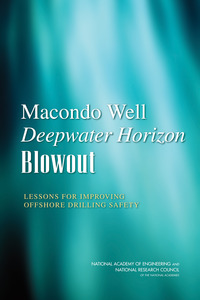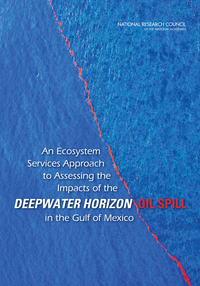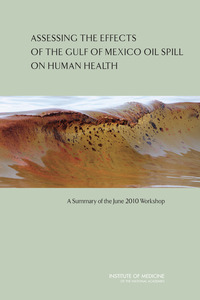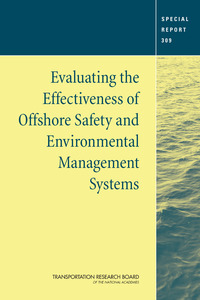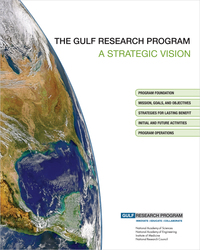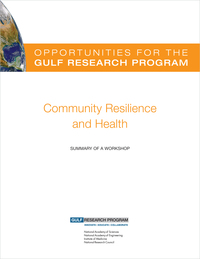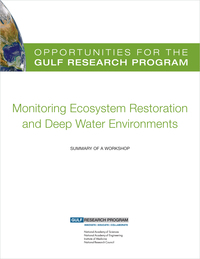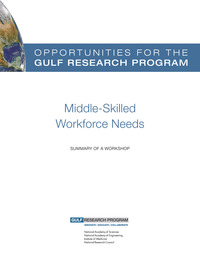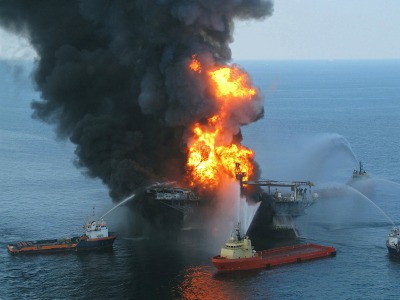 Five years ago today, firefighters were struggling in vain to extinguish a fire on the Deepwater Horizon oil rig in the Gulf of Mexico. The blowout of the Macondo well caused the explosion on the Deepwater Horizon oil rig, killing 11 crewmen and igniting a fireball visible from 40 miles away. On 22 April 2010, Deepwater Horizon sank, leaving the well gushing at the seabed and causing the largest oil spill in U.S. waters. It would be nearly three months before the well could be completely killed, during which time, nearly 5 million barrels of oil spilled into the gulf. Reports from the National Research Council, National Academy of Engineering, Institute of Medicine, and Transportation Research Board provided analysis of the spill and guidance for policy making, health care monitoring, and environmental protection. As part of the legal settlements with the companies held responsible, the federal government has asked the National Academy of Sciences to form and administer a 30-year program to enhance oil system safety, human health, and environmental resources in the Gulf of Mexico and other U.S. continental shelf areas where offshore oil and gas exploration and production occur or are under consideration. Reports from the Gulf Research Program focus on research and development, education and training, and environmental monitoring. All are free to download.
Five years ago today, firefighters were struggling in vain to extinguish a fire on the Deepwater Horizon oil rig in the Gulf of Mexico. The blowout of the Macondo well caused the explosion on the Deepwater Horizon oil rig, killing 11 crewmen and igniting a fireball visible from 40 miles away. On 22 April 2010, Deepwater Horizon sank, leaving the well gushing at the seabed and causing the largest oil spill in U.S. waters. It would be nearly three months before the well could be completely killed, during which time, nearly 5 million barrels of oil spilled into the gulf. Reports from the National Research Council, National Academy of Engineering, Institute of Medicine, and Transportation Research Board provided analysis of the spill and guidance for policy making, health care monitoring, and environmental protection. As part of the legal settlements with the companies held responsible, the federal government has asked the National Academy of Sciences to form and administer a 30-year program to enhance oil system safety, human health, and environmental resources in the Gulf of Mexico and other U.S. continental shelf areas where offshore oil and gas exploration and production occur or are under consideration. Reports from the Gulf Research Program focus on research and development, education and training, and environmental monitoring. All are free to download.
The blowout of the Macondo well on April 20, 2010, led to enormous consequences for the individuals involved in the drilling operations, and for their families. Eleven workers on the Deepwater Horizon drilling rig lost their lives and 16 others …
As the Gulf of Mexico recovers from the Deepwater Horizon oil spill, natural resource managers face the challenge of understanding the impacts of the spill and setting priorities for restoration work. The full value of losses resulting from the …
From the origin of the leak, to the amount of oil released into the environment, to the spill’s duration, the 2010 Gulf of Mexico oil spill poses unique challenges to human health. The risks associated with extensive, prolonged use of …
TRB Special Report 309: Evaluating the Effectiveness of Offshore Safety and Environmental Management Systems recommends that the Bureau of Safety and Environmental Enforcement (BSEE) take a holistic approach to evaluating the …
In 2010 the Deepwater Horizon explosion and fire in the Gulf of Mexico caused the largest offshore oil spill in U.S. history, resulting in significant impacts on the region’s environment and residents. Legal settlements with the …
There are many connections between human communities and their surrounding environments that influence community resilience and health in the Gulf of Mexico. The impacts of the Deepwater Horizon oil spill on Gulf communities and ecosystems …
Environmental monitoring in the Gulf of Mexico poses extensive challenges and significant opportunities. Multiple jurisdictions manage this biogeographically and culturally diverse region, whose monitoring programs tend to be project-specific by …
During the period 1990 to 2010, U.S. job growth occurred primarily in the high-skilled and low-skilled sectors. Yet, one-third of projected job growth for the period 2010-2020 will require middle-skilled workers — who will earn strong …
